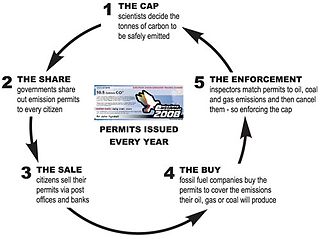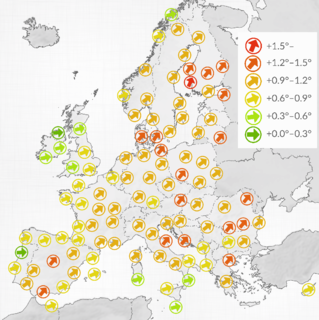Related Research Articles

The Kyoto Protocol was an international treaty which extended the 1992 United Nations Framework Convention on Climate Change (UNFCCC) that commits state parties to reduce greenhouse gas emissions, based on the scientific consensus that (part one) global warming is occurring and (part two) that human-made CO2 emissions are driving it. The Kyoto Protocol was adopted in Kyoto, Japan, on 11 December 1997 and entered into force on 16 February 2005. There were 192 parties (Canada withdrew from the protocol, effective December 2012) to the Protocol in 2020.

Nicholas Herbert Stern, Baron Stern of Brentford, is a British economist, banker, and academic. He is the IG Patel Professor of Economics and Government and Chair of the Grantham Research Institute on Climate Change and the Environment at the London School of Economics (LSE), and 2010 Professor of Collège de France. He was President of the British Academy from 2013 to 2017, and was elected Fellow of the Royal Society in 2014.
The Stern Review on the Economics of Climate Change is a 700-page report released for the Government of the United Kingdom on 30 October 2006 by economist Nicholas Stern, chair of the Grantham Research Institute on Climate Change and the Environment at the London School of Economics (LSE) and also chair of the Centre for Climate Change Economics and Policy (CCCEP) at Leeds University and LSE. The report discusses the effect of global warming on the world economy. Although not the first economic report on climate change, it is significant as the largest and most widely known and discussed report of its kind.

Cap and Share was originally developed by Feasta. It is a regulatory and economic framework for controlling the use of fossil fuels in relation to climate stabilization. Convinced that climate change is a global problem and that there is a need to cap and reduce greenhouse gas emissions globally, the philosophy of Cap and Share maintains that the earth’s atmosphere is a fundamental common resource. Consequently, it is argued, each individual should get an equal share of the benefits from the limited amount of fossil fuels that will have to be burned and their emissions released into the atmosphere in the period until the atmospheric concentration of greenhouse gases has been stabilized at a safe level.
Feasta, the Foundation for the Economics of Sustainability is an organisation based in Ireland which aims "to identify the characteristics of a truly sustainable society, articulate how the necessary transition can be effected and promote the implementation of the measures required for this purpose". It was founded in Dublin, Ireland in 1998.

A low-carbon economy (LCE) or decarbonised economy is an economy based on energy sources that produce low levels of greenhouse gas (GHG) emissions. GHG emissions due to human activity are the dominant cause of observed climate change since the mid-20th century. Continued emission of greenhouse gases will cause long-lasting changes around the world, increasing the likelihood of severe, pervasive, and irreversible effects for people and ecosystems. Shifting to a low-carbon economy on a global scale could bring substantial benefits both for developed and developing countries. Many countries around the world are designing and implementing low-emission development strategies (LEDS). These strategies seek to achieve social, economic, and environmental development goals while reducing long-term greenhouse gas emissions and increasing resilience to the effects of climate change.
Energy Saving Trust (EST) is a British organization devoted to promoting energy efficiency, energy conservation, and the sustainable use of energy, thereby reducing carbon dioxide emissions and helping to prevent man-made climate change. It was founded in the United Kingdom as a government-sponsored initiative in 1992, following the global Earth Summit.
The Climate Change Committee (CCC), originally named the Committee on Climate Change, is an independent non-departmental public body, formed under the Climate Change Act (2008) to advise the United Kingdom and devolved Governments and Parliaments on tackling and preparing for climate change. The Committee provides advice on setting carbon budgets, and reports regularly to the Parliaments and Assemblies on the progress made in reducing greenhouse gas emissions. Notably, in 2019 the CCC recommended the adoption of a target of net zero greenhouse gas emissions by the United Kingdom by 2050. On 27 June 2019 the British Parliament amended the Climate Change Act (2008) to include a commitment to net zero emissions by 2050. The CCC also advises and comments on the UK's progress on Climate change adaptation through updates to Parliament.

Carbon pricing also known as cap and trade (CAT) or emissions trading scheme (ETS) is a method for nations to reduce global warming. The cost is applied to greenhouse gas emissions in order to encourage polluters to reduce the combustion of coal, oil and gas – the main driver of climate change. The method is widely agreed and considered to be efficient. Carbon pricing seeks to address the economic problem that emissions of CO2 and other greenhouse gases (GHG) are a negative externality — a detrimental product that is not charged for by any market.

The Carbon Pollution Reduction Scheme was a cap-and-trade emissions trading scheme for anthropogenic greenhouse gases proposed by the Rudd government, as part of its climate change policy, which had been due to commence in Australia in 2010. It marked a major change in the energy policy of Australia. The policy began to be formulated in April 2007, when the federal Labor Party was in Opposition and the six Labor-controlled states commissioned an independent review on energy policy, the Garnaut Climate Change Review, which published a number of reports. After Labor won the 2007 federal election and formed government, it published a Green Paper on climate change for discussion and comment. The Federal Treasury then modelled some of the financial and economic impacts of the proposed CPRS scheme.

Steve Hatfield Dodds is an Australian philosophical economist, with notable work in the social cost of economic decision-making and particularly sustainable development and the economic impact of climate change.

Professor Ross Garnaut led two climate change reviews, the first commencing in 2007 and the second in 2010.

Emission trading (ETS) for carbon dioxide (CO2) and other greenhouse gases (GHG) is a form of carbon pricing; also known as cap and trade (CAT) or carbon pricing. It is an approach to limit climate change by creating a market with limited allowances for emissions. This can lower competitiveness of fossil fuels and accelerate investments into low carbon sources of energy such as wind power and photovoltaics. Fossil fuels are the main driver for climate change. They account for 89% of all CO2 emissions and 68% of all GHG emissions.
The Global Climate Network (GCN) is an alliance of influential think tanks and research institutes in different countries that collaborate on research into climate change policy and whose stated aim is to help address the political blockages to ambitious action to tackle global warming.

Climate change in Canada has had large impacts on the country's environment and landscapes. The number of climate change–related events, such as the 2021 British Columbia Floods and an increasing number of forest fires, has become an increasing concern over time. Canada's annual average temperature over land has warmed by 1.7 degrees Celsius since 1948. The rate of warming is even higher in Canada's north, the Prairies, and northern British Columbia. The country's precipitation has increased in recent years and extreme weather events have become more common.

Climate change in the United Kingdom is leading to a range of impacts on the natural environment and humans, including increasing storms, floods, heatwaves and sea level rise. Climate change inaction has been a subject of protest and controversies and various policies have been developed to mitigate its effects. The government has a commitment to reduce greenhouse gas emissions by the United Kingdom by 50% on 1990 levels by 2025 and to net zero by 2050. In May 2019, Parliament declared a 'climate change emergency', however this does not legally compel the government to act.
This article is about the Kyoto Protocol and government action in relation to that treaty.

Climate change in Europe has resulted in an increase in temperature of 1.9 °C (2019) in the EU compared to pre-industrial level. According to international climate experts, global temperature rise should not exceed 2 °C to prevent the most dangerous consequences of climate change, without CO2 emissions cut that could happen before 2050. Emission reduction means development and implementation of new energy technology solutions. Some people consider that the technology revolution has already started in Europe, since the markets for renewable technology have annually grown.
Citizens' Climate Lobby (CCL) is an international grassroots environmental group that trains and supports volunteers to build relationships with their elected representatives in order to influence climate policy. The CCL is a registered 501(c)(4) with approximately $680,000 in revenue in the United States in 2018. Operating since 2007, the goal of CCL is to build political support across party lines to put a price on carbon, specifically a revenue-neutral carbon fee and dividend (CF&D) at the national level. CCL is supported by notable climate scientists James Hansen, Katharine Hayhoe, and Daniel Kammen. CCL's advisory board also includes former Secretary of State George P. Shultz, former US Representative Bob Inglis, actor Don Cheadle, and RESULTS founder Sam Daley-Harris.

Julia K. Steinberger is Professor of Ecological Economics at the University of Lausanne. She studies the relationships between the use of resources and performance of societies. She is an author of the Intergovernmental Panel on Climate Change (IPCC) 6th Assessment Report, contributing to the report's discussion of climate change mitigation pathways.
References
- ↑ Richard Black, Copenhagen climate summit undone by 'arrogance', BBC News, 16 March 2010.
- ↑ "Our Work" . Retrieved 7 April 2019.
- ↑ "Big increase in economic costs if cuts in greenhouse gas emissions are delayed". 26 September 2018.
- ↑ "£3.5m network launched to tackle climate change in Edinburgh, Belfast and Leeds". Environment Journal. 31 January 2019.